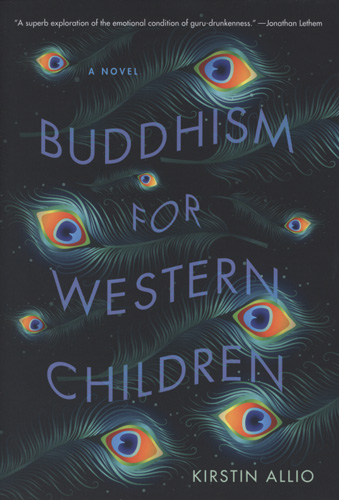Buddhism for Western Children
This book is tough. Buddhism for Western Children is a novel about a ten-year-old boy and his family, who drive from Halifax, Canada to Maine in order to meet and live with Avadhoot Master King Ivanovich, spiritual guru. It’s not a light, beach read, but a pearl that takes time. I will go ahead and say that it might irritate you a bit. There aren’t many quotation marks—and plenty of people speak throughout the novel—but once that epiphany sparks, the fact that the ten-year-old boy (Daniel) is just as perplexed, if not more, Buddhism for Western Children becomes this unbelievable, almost method-acted attempt to convey sensory overload.
This book is tough. Buddhism for Western Children is a novel about a ten-year-old boy and his family, who drive from Halifax, Canada to Maine in order to meet and live with Avadhoot Master King Ivanovich, spiritual guru. It’s not a light, beach read, but a pearl that takes time. I will go ahead and say that it might irritate you a bit. There aren’t many quotation marks—and plenty of people speak throughout the novel—but once that epiphany sparks, the fact that the ten-year-old boy (Daniel) is just as perplexed, if not more, Buddhism for Western Children becomes this unbelievable, almost method-acted attempt to convey sensory overload.
At heart, it’s a coming-of-age story. While living with the guru and his followers (including, but not limited to his nine wives), Daniel is assigned the task of documenting everyone’s “Leelas,” the tales of how they came into contact with Avadhoot. During this process, Daniel hears all sorts of unnerving anecdotes, which seem to melt into who Daniel is himself. On the commune, there is no “I” (unless the guru says it, which he does often), and seven years later, Daniel runs away and finds solace in a therapist named Ruth. He goes on and on about the other followers’ Leelas, but when she asks about him, Daniel doesn’t know how to respond.
Aside from the selfless mantras of the commune, Daniel’s uncertainty and wall of defense probably has to do with his name, which, approximately a quarter of the way into the book, is changed by the guru to “Jubal.” How could one talk about oneself when he’s both dead and alive, no one and all people simultaneously?
Throughout the novel, Avadhoot’s maxims appear as constant reminders that, no matter where Daniel (or Jubal) goes, He will always haunt him. This is quite pleasurable, however, because the guru manipulates his followers by telling them that, if they were to leave Him, they’d die; His haunting Daniel falsifies this declaration by proving that, in actuality, He’s the ghost, only allowed to linger in the gray space of the past. I love the guru’s character, if only because of His ridiculousness: all his He’s and Him’s are, indeed, capitalized; He is a huge fan of Disney; and it’s rumored that He has the largest collection of dildos in America.
The character Ruth interests me, too. I wonder what makes her any different than the guru. She classifies her sessions with Jubal as “treatment,” which was, essentially, what Daniel’s parents fled to Maine for.
This could be incorrect, but I imagine that the title is what it is because true Buddhists do not believe in a personal god. In this story, however, Avadhoot tells his followers that he is a god in human form, and so they see him as such. I see it as a critique on the West’s appropriation, and how over and over again, we get it so absolutely wrong. In addition to this, there’s a need in the West to be told what to do, what to think. By now, this notion is cliché, but clichés are clichés for a reason—which is, of course, in itself one.
This entire novel is disturbing because it’s barely fiction. It draws on experiences from Allio’s own childhood (which can be read about on Literary Hub) but that is not what I mean. I mean that there are countless “gurus” out there toying with minds that are begging for help, minds so delicate they think they’d do better in someone else’s possession. I mean that this will keep happening, too, unless more books like this are published: books that tear away at the flesh and expose nothing but dark red blood.
Buddhism for Western Children is insane. It’s a weird, fun, and horrifying dream. Allio’s sentences are stunning (e.g. Concerning the air: “It’s so fresh it seems carbonated.”) and the end is home to the best plot twist of 2018. I said it. Read the book and tell me I’m wrong.





